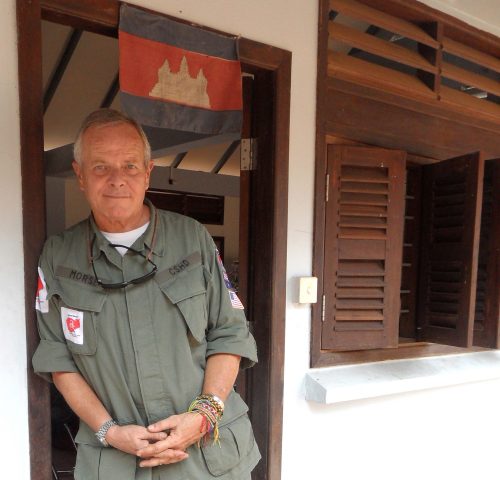Cambodian Landmine Relief: An Update
July 13, 2020

William Morse ’71, dressed in the fatigues worn by the demining teams of Cambodian Self-Help Demining, an organization dedicated to finding and disarming landmines and unexploded ordnance in parts of Cambodia deemed “low priority” by the government’s mine-clearing efforts. Photo courtesy of Landmine Relief Fund
William “Bill” Morse ’71 gave up retirement in Palm Springs, California, and moved to Cambodia to clear landmines. Now the COVID-19 pandemic threatens his entire operation, which includes a school system and museum.
As of July 12, Cambodia had a total of 156 confirmed cases of the novel coronavirus. The Cambodian government took swift protective measures at the borders, including the requirement of a COVID-19 negative medical certificate for all foreign travelers entering Cambodia and a $3,000 deposit for testing and potential treatment services. If one or more travelers on an arriving flight or vessel tests positive for COVID-19, all passengers must quarantine for 14 days “at a location designated by Cambodian authorities,” according to the U.S. Embassy in Cambodia. If all travelers test negative, travelers have to self-isolate for 14 days at their homes or lodging.
“The tourist industry has collapsed,” said Morse, whose Landmine Museum and Relief Center has been closed since March. “And it’s going to get a lot worse before it gets better.”
Morse’s Landmine Relief Fund also supports The Rural Schools Village Program. The organization’s schools are located in 20 villages and serve nearly 3,000 children.
The Cambodian Ministry of Education closed schools in March and announced this month that all schools will remain closed for the rest of the year. Though the Ministry of Education set up free online courses for students preparing for the national exams, as well as videos of classroom sessions available on TV and social media platforms, none of the schools in the Rural Schools Village Program are connected to the internet, Morse said.
Instead, teachers in the program are traveling to villages to teach small groups of kids.
Morse also started a small food distribution program in Siem Reap, a cultural center near popular temples, to help people who had relied on income from the tourism industry. In May Morse provided 30 tons of food, and another 30 tons the following month.
Share your story!
Email us at tcumagazine@tcu.edu

Your comments are welcome
Comments
Related reading:
Features
Bill Morse Helps Cambodians Remove Landmines
After decades of war, alumnus works to clear the field and build schools.
Web Extras
TCU Magazine Podcast: Bill Morse
Trading retirement plans for landmine removal efforts, the alumnus works to clear Cambodia and build schools.